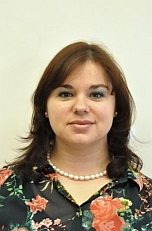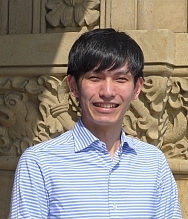CONTENTS |
1. Information |
2. Column |
|
(Assistant Professor, United Arab Emirates University/Visiting Professor, IER, Hitotsubashi University)
|
 |
|
(Adjunctt Assistant Professor, IER, Hitotsubashi University)
|
 |
“Encounter with AgEcon”
I accepted the position of Adjunct Assistant Professor at the Institute of Economic Research starting this year.
Since I just earned my PhD last year, in many ways I feel like I’m at risk like a driver who has just earned a driver’s license, but still I feel driven to write high-quality papers while referring to the driving techniques of the Institute’s professors.
My specialty is agricultural economics. Looking back now, originally I wanted to move in this direction because in high school I was fascinated by agricultural chemistry, but at that time I decided to enter the Faculty of Economics because I felt uneasy about whether or not I could grow accustomed to what I considered a hard sciences environment. I still remember how excited I was, as somebody originally interested in agriculture, to learn of the academic field of agricultural economics. It felt as if I had discovered something special, that connected a place for me to be at that time with what I really wanted to do.
Studying agricultural economics, I learned that agriculture and food are special in a way. But that special quality does not necessarily mean that we should treat agriculture in a special way (i.e., protectionism). It was said that my faculty advisor in graduate school, Prof. Masayoshi Honma (then a professor of Agricultural and Resource Economics at the University of Tokyo) often argued with Prof. Nobuhiro Suzuki, who was in a neighboring field, about the pros and cons of free-trade agreements, with Prof. Shinichi Shougenji serving as a mediator between them. Listening to their debates, I became enamored with the simple question of what kinds of real (empirical) effects the elimination of tariffs on agricultural produce would have on the domestic economy, and actually this would become the subject of my degree thesis.
To elucidate this topic, I conducted a simulation analysis of the elimination of tariffs on the dairy-products market. I employed the methodology of developing a demand-supply model for the main dairy products (butter, nonfat milk, and cheese) and calibrating deep parameters (using elasticity values from previous studies). Even though I strived to take into consideration matters such as the specific properties of dairy products as commodities and regional differences in production structures, still numerous issues remained with regard to the propriety of various assumptions on subjects such as the elasticity values I employed, the forms of functions used, and anticipated market structures. This gave me a deep feeling for just how difficult simulation analysis can be.
In my doctoral program, I began econometric studies including estimation of elasticity based on my master’s thesis. While I had heard about the extreme example that said that an ordinary least squares (OLS) model had been enough for a paper in the past, thanks to advances in econometrics in recent years it proved a considerable technical challenge just to estimate a single elasticity. At the same time, I had plenty of opportunities to experience just how interesting pure statistics and econometrics can be, and lately I am very interested in sharing this academic enjoyment. (In the first semester, I taught statistics at Gakushuin University, and in the second semester, I will teach applied quantitative econometrics at the University of Tokyo.)
Since earning my PhD, I have carried out empirical research in the domains of development economics and environmental economics. Since assuming this position at the Institute, I also have conducted research in the field of food economics, using point-of-sale data. While these studies have not yet borne fruit, I would like to take advantage of the Institute’s excellent research environment to generate findings that are meaningful in terms of both policy and academics.
3. Visitors |
Yuta Takahashi (Northwestern University) 2018/9/1-2019/3/31
Hidenori Takahashi (University of Mannheim) 2018/6/30-2018/8/30
Kensuke Teshima (Instituto Tecnológico Autónomo de México (ITAM)) 2018/6/1-2018/8/18
Konosuke Odaka Hitotsubashi University (Professor Emeritus) 2018/4/1-2019/3/31
Osamu Saito (Hitotsubashi University (Professor Emeritus)) 2018/4/1-2019/3/31
4. Seminar Schedule |
5. New Publications |